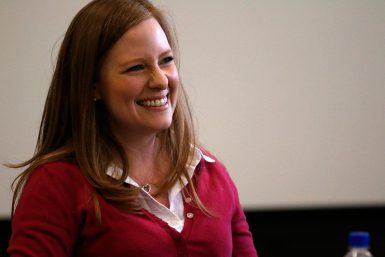Columnist Falkenberg describes power of opinion writing

Opinion writing gives journalists the ability to become advocates, columnist Lisa Falkenberg told journalism students Wednesday evening.
Falkenberg, who won the Pulitzer Prize for Commentary April 20, discussed how traditional reporting and column writing vary.
“People do want something different from a columnist than they want from a reporter,” Falkenberg said. “One of the great things about this job is you have so much more power to effect change.”
A guest of professor of practice Tom French’s Behind the Prize class, Falkenberg spoke to an audience of about 50 people in Ernie Pyle Hall auditorium. French brings a dozen or so journalists who have won or were finalists in top media prizes to campus each semester to speak to his students.
As the metro columnist for the Houston Chronicle, Falkenberg said prefers writing about social issues and criminal justice. Her Pulitzer Prize entry consisted of a selection of 10 columns and brought the Houston Chronicle its first ever Pulitzer win.
Seven of Falkenberg’s 10 columns focused on the wrongful conviction of a man accused of killing a Houston police officer. Falkenberg’s columns challenged the Texas grand jury system by referencing evidence withheld from the defense and the intimidation of witnesses.

“Liberty is really important,” Falkenberg said. “When you’re relying on the criminal justice system, pretty much the worst thing you can have happen is for somebody to take your liberty away.”
Falkenberg, a former Austin bureau reporter for The Associated Press, decided to cover the case through her column rather than traditional reporting because she felt the story needed an advocate.
“My colleagues, some of them whom are straight reporters, if they feel a certain way about something, they just can’t say it,” she said. “Well, I can just say it.”
Falkenberg used her column as an outlet to criticize the local district attorney on the case and call for the investigation of the real killer.
“I’m trying to change a small portion of the world,” Falkenberg said. “You can be a journalist and an advocate at the same time.”
Expressing opinions, however, did not come naturally to Falkenberg, a self-described introvert.
“I was scared to death, frankly, of voicing my opinions of things,” she said. “As a reporter, you’re trained not to have an opinion.”

Falkenberg said that after her first six to seven years of column writing, she has finally been able to find her comfort zone, although it hasn’t always been easy. Writing for a largely conservative audience, Falkenberg often receives hate mail.
“It’s hard knowing that the majority of the state does not agree with me,” she said. “But I think I’ve changed a few minds over the years, and those are actually the most rewarding emails.”
Falkenberg did change the mind of one audience member, senior Sydney Franklin, who said her view of columnists prior to the talk revolved around girly clichés like Sex and the City.
“She brings a lot of importance to issues in her columns,” Franklin said. “And if you can do that, that’s really powerful.”
More:

